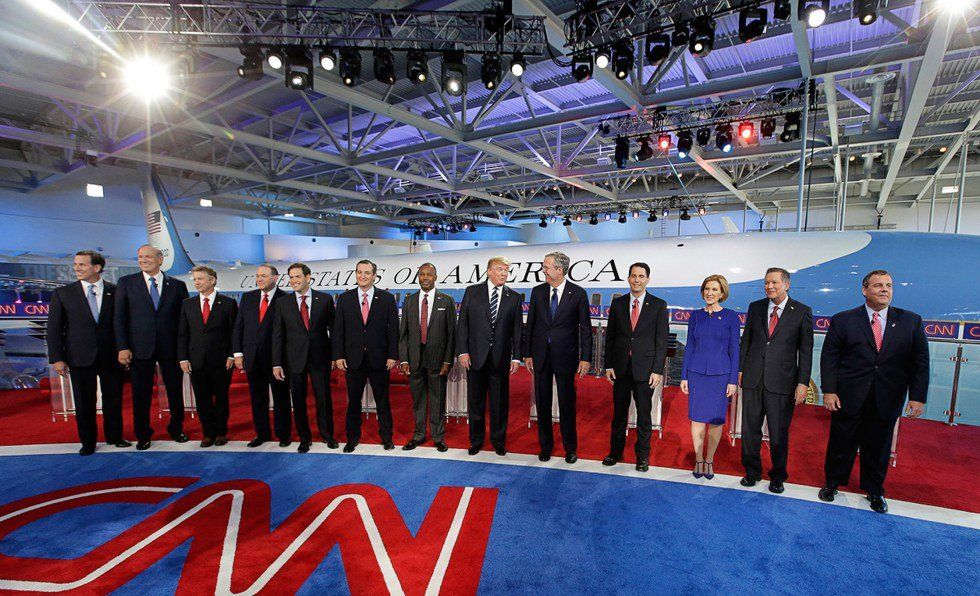Before I begin, there’s one thing I want to make clear: I do not identify with either of the two major political parties in the U.S. At the moment, there are bits and pieces of candidates from both of the major parties that I like, but I (luckily) still have over a year before I officially cast my vote.
With that being said, I was looking forward to last Wednesday’s GOP debate. Although, in hindsight, I would call it more of a “loud talking contest” than an actual debate. One of the most fascinating things about this election season so far has been Donald Trump’s candidacy. This is only the second presidential election that I’ve followed avidly, and the first in which I’ll be able to vote.
Let’s take it back to Donald Trump’s interview with Rolling Stone a couple of weeks ago. Of fellow candidate Carly Fiorina, Trump said, “'Look at that face…Would anyone vote for that? Can you imagine that, the face of our next president?!'" This exemplifies one of the most baffling things about Trump’s campaign so far. Every once in awhile, he’ll say something that (at the surface, at least) seems less-than-terrible. But he has this serious inability to quit while he’s ahead.
It’s not just that he called out a woman for being – in his opinion – unattractive. He implied that a candidate’s capabilities as president would be substantially affected by her appearance. Of course, he tried to save his you-know-what by clarifying that he was talking about her persona rather than her actual face. Fiorina handled this incredibly well when put on the spot, saying that “women all over this country heard very clearly what Mr. Trump said.” He said that women are objects and that their value is determined by their looks. For what it’s worth, he also implicitly said that he considers himself better-looking than Fiorina. I’m just going to leave that one there.
I think that the only way to explain Trump’s behavior and bizarre comments is his lack of a donor list. He’s a billionaire who’s essentially fully funding his own campaign. This prevents him from being tied down to anyone, so he doesn’t have to worry about stepping on toes. However, I do think that he’s taken this a bit too far and I don’t think that making blatantly offensive comments against a large part of your to-be constituency is a good campaign tactic.
One of Fiorina’s biggest victories aside from her response to Trump’s face-shaming was her refusal to attack her opponents as aggressively as they denounced each other. She was given opportunity after opportunity to pit herself against them, but wouldn’t succumb. Fiorina said that she would allow the voters to decide on candidates’ characters, and although a primary victory is unlikely, this approach allows the public to see her in a positive light that contrasts with her opponents.
One of the biggest problems I found with this debate, as with many others, was that it didn’t have as much actual political content as I would have liked. Of course, when you put a group of people who are all vying for public support on a stage, it’s expected that they’ll spend a great deal of their time comparing their own accomplishments to their opponents,' or at the very least detailing what they have done in the past.
I think that the one of the most in-depth policy-oriented discussions, with the exception of Jeb Bush being asked to critique his brother’s decisions, came when the candidates were discussing marijuana legalization. Rand Paul was the only candidate who took a pro-legalization (or at least pro-decriminalization) problem, largely because of the way that drug laws unfairly target minorities. Chris Christie and Bush, who admitted to having smoked pot in the past, both are campaigning against marijuana legalization legislation. Fiorina took a similar stance and advocated for increased access to drug rehabilitation, an issue that hits close to home for her because she lost a daughter to drug addiction.
Overall, I would say that this debate was anticlimactic at best. I wasn’t particularly fond of the way that it was run, and I think that there was too much of an imbalance among the amount of time that each candidate was given to speak. The questions were tailored to top-polling candidates and, as expected, were designed with the intention of pitting candidates against one another. I look forward to October’s first Democratic Party debate, as it will give us a better opportunity to look at the candidate field collectively.





















